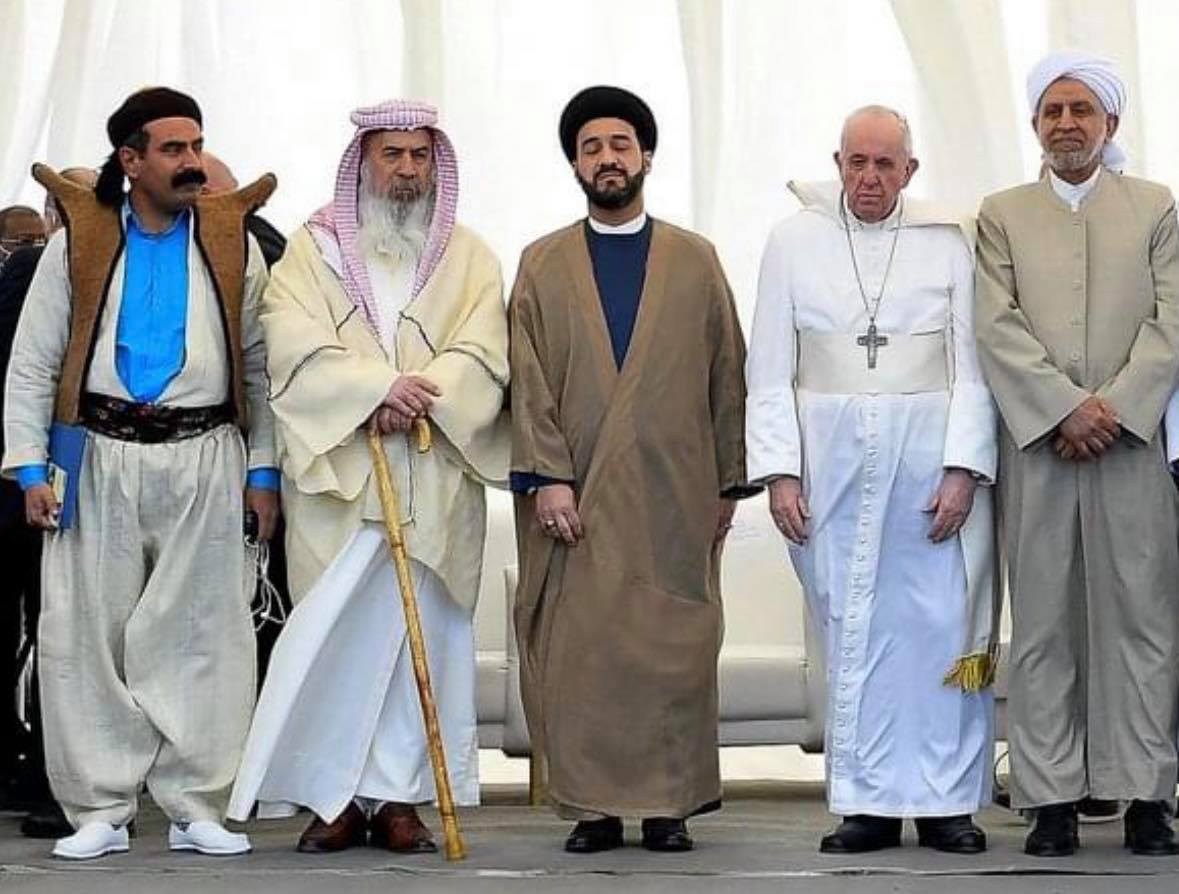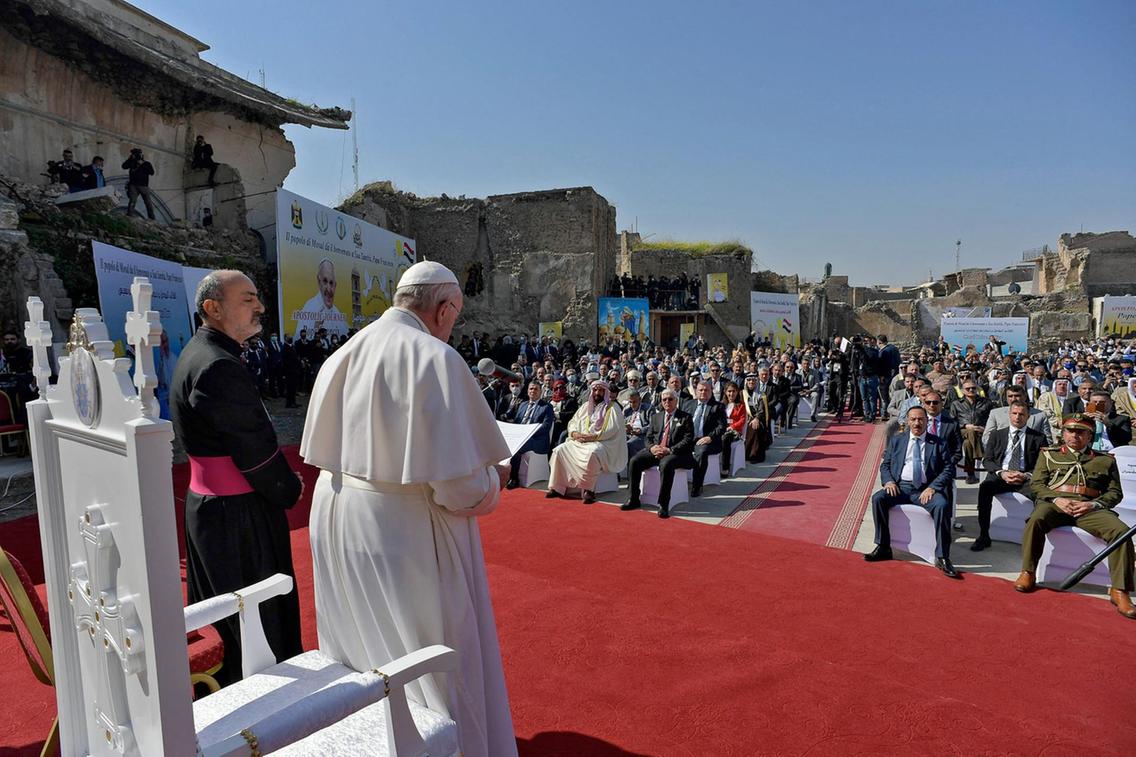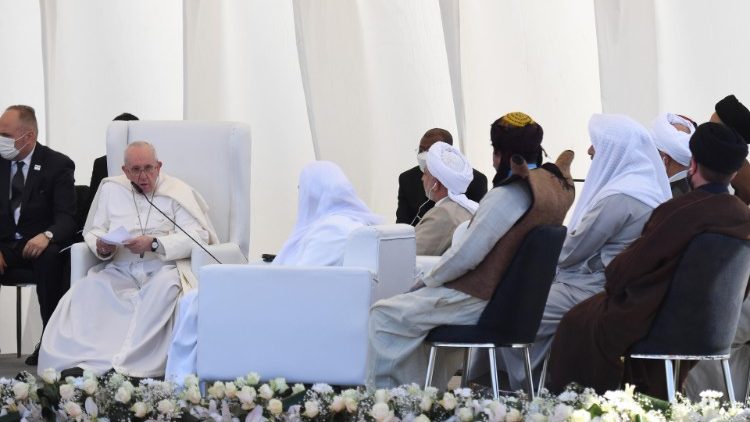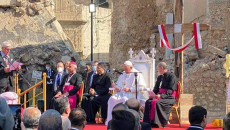The Kaka'i ethno-religious minority in Iraq handed over two letters to Pope Francis in his apostolic 3-day trip to Iraq, calling him to press Iraqi officials to sort out disputed territories issue and refrain from hatred and extremism.
On March 6th, Pope Francis travelled south from Baghdad to the ancient city of Ur to hold an historic interreligious meeting on Saturday, the second day of his Apostolic visit to Iraq.
After the meeting, the Pope gathered in prayer together Muslims, Jews, representatives of Iraq’s Christian Churches, and members of Iraqi religious minorities, including the Ezidis and Sabaeans, for peace, reconciliation and the strength to rebuild the conflict-ravaged nation.
Rajab A'si Kaka'i, an activist, handed over the letrer of kaka'I community in Iraq to the pontiff. Rajab said they handed over two letters to Pope. "The first one was signed by Iraqi Kaka'i key social figures and clerics calling on Pope to offer advice to Iraqi politicians to sort out the challenges in the disputed territories including implementation of article 140 of Iraqi constitution."

Rajab, first from the left, in the interreligious meeting with Pope Francis in Ur, south of Iraq on March 6th. Photo by the Vatican media.
"Part of our problems is related to implementation of this article which will bring reconstruction to our region," he said.
"Part of our problems is related to implementation of this article which will bring reconstruction to our region," he said.
Kaka'i, Ahl al-Haq or Yarsanism, is a secretive monotheist spiritual religion which has not been officially recognized in the Iraqi constitution. Their villages are a target for extremist Islamic militants whom persecuted them as they accuse them of being idol worshippers.
After fall of Saddam regime in 2003, article 140 of Iraqi constitution was outlined in 2005 as a framework for the determination of the fate of the disputed areas. The three-stage process requires the normalization of the areas, conducting a census, and holding a referendum to know the will of the people to join Baghdad federal government or Iraq's Erbil-based Kurdistan region government KRG. Up today, part of the first stage has been implemented.
The religious minorities of Kak'is and Ezidis are residing the disputed territories of Mosul, Kirkuk and Diyalah. Unlike Ezidi, Christian and other religious and ethnic minorities in Iraq who are represented under quota bill in Iraqi and Kurdistan parliament, the Kaka’is have no special seats and they join key political parties and parliamentary lists in order to be represented.
"We also asked to eradicate the promotion for hatred and extremism discourse and thought and alternatively resort to fraternity, harmony and tolerance," he added.
"We also asked to eradicate the promotion for hatred and extremism discourse and thought and alternatively resort to fraternity, harmony and tolerance," he added.
Rajab said they elaborated the challenges that religious minorities face especially in the disputed territories which is a mosaic of religious sects making it a "target by extremist groups."
Kaka'is are based in Kirkuk, Diayalah, Mosul and Sulaimaniyah as well. Unofficial figures show they are about 100,000 people.

Pope Francis leading sufferage prayer for victims of war amid the ruins of Hosh al-Baeia church in Mosul on March 7th. Photo by AFP.
The second letter by The Kaka'is was signed by the key figure of kak'is in the world asking Pope to highlight their religion and suffering.
"Key figure of Kaka'is in the world signed the letter and calls on him to pay more attention to Kak'is and solve their problems all over the world," rajab added.
Following the welcome ceremony by Iraqi Prime Minister in Baghdad International airport on Friday march 5th, the pontiff delivered a speech in Baghdad Presidential Palace to a gathering of senior Iraqi officials, political figures, religious clerics, diplomats and representatives of NGOs.
On the first-ever papal visit to Iraq, Pope Francis has called on Iraqi leaders to end violence and factions and open the way for those who are faithfully willing to bring in peace through constructive dialogue.






